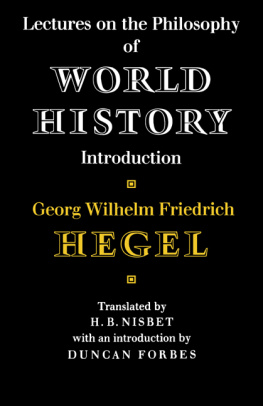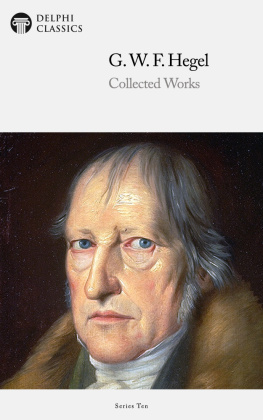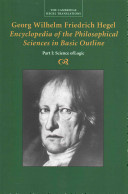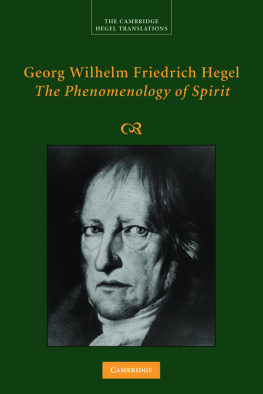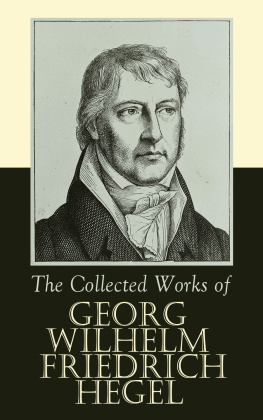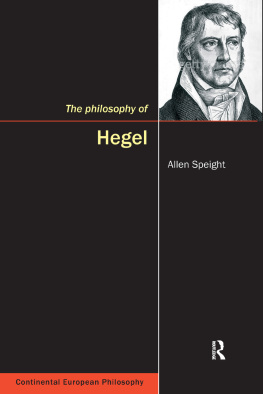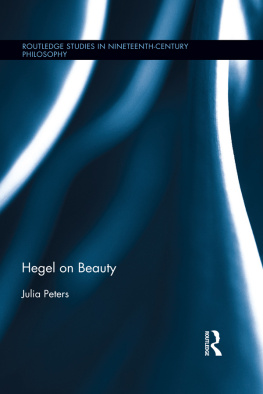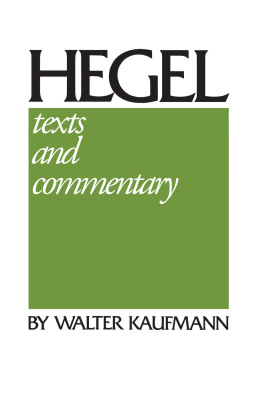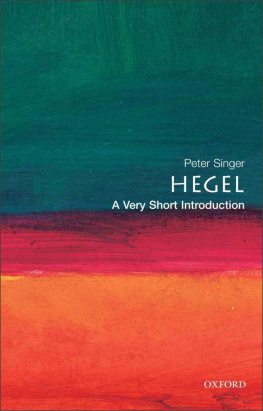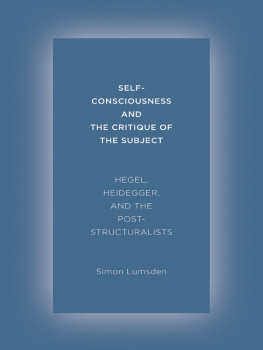Georg Wilhelm Friedrich Hegel - Lectures on the Philosophy of World History
Here you can read online Georg Wilhelm Friedrich Hegel - Lectures on the Philosophy of World History full text of the book (entire story) in english for free. Download pdf and epub, get meaning, cover and reviews about this ebook. year: 1975, publisher: Cambridge University Press, genre: Religion. Description of the work, (preface) as well as reviews are available. Best literature library LitArk.com created for fans of good reading and offers a wide selection of genres:
Romance novel
Science fiction
Adventure
Detective
Science
History
Home and family
Prose
Art
Politics
Computer
Non-fiction
Religion
Business
Children
Humor
Choose a favorite category and find really read worthwhile books. Enjoy immersion in the world of imagination, feel the emotions of the characters or learn something new for yourself, make an fascinating discovery.
- Book:Lectures on the Philosophy of World History
- Author:
- Publisher:Cambridge University Press
- Genre:
- Year:1975
- Rating:3 / 5
- Favourites:Add to favourites
- Your mark:
- 60
- 1
- 2
- 3
- 4
- 5
Lectures on the Philosophy of World History: summary, description and annotation
We offer to read an annotation, description, summary or preface (depends on what the author of the book "Lectures on the Philosophy of World History" wrote himself). If you haven't found the necessary information about the book — write in the comments, we will try to find it.
Lectures on the Philosophy of World History — read online for free the complete book (whole text) full work
Below is the text of the book, divided by pages. System saving the place of the last page read, allows you to conveniently read the book "Lectures on the Philosophy of World History" online for free, without having to search again every time where you left off. Put a bookmark, and you can go to the page where you finished reading at any time.
Font size:
Interval:
Bookmark:
GEORG WILHELM FRIEDRICH HEGEL LECTURES ON THE PHILOSOPHY OF WORLD HISTORY
INTRODUCTION: REASON IN HISTORY
Cambridge Studies in the History and Theory of Politics
EDITORS
MAURICE COWLING E. KEDOURIE
G.R. ELTON J.R. POLE
WALTER ULLMANN
GEORG WILHELM FRIEDRICH
HEGEL
LECTURES ON THE PHILOSOPHY OF WORLD HISTORY

INTRODUCTION: REASON IN HISTORY
translated from the German edition of Johannes Hoffmeister by
H. B. NISBET
Professor of German, University of St Andrews
with an Introduction by
DUNCAN FORBES
Fellow of Clare College, Cambridge

CAMBRIDGE UNIVERSITY PRESS
CAMBRIDGE
LONDON NEW YORK NEW ROCHELLE
MELBOURNE SYDNEY
Published by the Press Syndicate of the University of Cambridge
The Pitt Building, Trumpington Street, Cambridge CB2 IRP
32 East 57th Street, New York, NY 10022, USA
10 Stamford Road, Oakleigh, Melbourne 3166, Australia
www.cambridge.org
Information on this title: www.cambridge.org/9780521205665
Cambridge University Press 1975
First published 1975
First paperback edition 1980
Reprinted 1982 1984
British Library Cataloguing in Publication Data
Hegel, Georg Wilhelm Friedrich
[Vorlesungen ber die Philosophie der Geschichte. English.Selections]. Lectures on the philosophy of world history, introduction. (Cambridge studies in the history and theory of politics).
I. History Philosophy
I. Title II. Lectures on the philosophy of world history
III. Nisbet, Hugh Barr IV. Series
901 D16.8 74-79137
ISBN 0 521 20566 2 hard covers
ISBN 0 521 28145 8 paperback
Transferred to digital printing 2002
CONTENTS

Georg Wilhelm Friedrich Hegel
Lectures on the Philosophy of World History
Introduction: Reason in History
edited by Johannes Hoffmeister
INTRODUCTION

1. The Cloud of Unknowing and die Sache selbst
The English reader is given here a translation not of the whole of Hegels philosophy of history, but of Johannes Hoffmeisters edition of Hegels own Introduction to his lectures on the philosophy of world history. Since for Hegel philosophy is the science without presuppositions, through and through self-critical, and thus a self-developing whole or circle whose end is its beginning, any introduction to any section of it can only be a preliminary sketch of what is to come in the light of the whole. Hegels Introduction therefore contains his whole philosophy in epitome.
There is no danger in this for those who know the other main texts. But because the philosophy of history is by far the easiest of these Hegel himself seems to have thought of these lectures as a popular introduction to his philosophy it is liable to be used as a substitute rather than an introduction, especially as a substitute for the Philosophy of Right, and one suspects that much of the misunderstanding and misrepresentation of Hegel has been due to this.on the iniquities of a system which they have not begun to understand properly. And there are the sly innuendoes of otherwise learned men, which are difficult to nail because the nature and depth of the ignorance involved cannot be properly established. It is not easy to gauge how much of the old Hegel legend still survives; judging by the remarks still liable to be made by highly placed academic persons it is by no means defunct, even in the most scholarly circles. But an Introduction of this sort cannot put this right; one must take a lot for granted and hope for the best.
Another difficulty is that Hegels philosophy of history is nowadays generally regarded as the prime example of what philosophy of history is not, without being adequately understood. Those who do philosophy of history in the contemporary analytical style do not fully understand Hegel why should they? Those who know Hegel do not as a rule care for his philosophy of history, and do not think it worthy of intensive study in the light of modern developments to appreciate it properly, moreover, one would need to be something of a historian and a historian of history as well. The qualities demanded are not likely to be combined these days.
So Hegels philosophy of history is largely unexplored, and indeed, in spite of the enormous literature, one is tempted to say the same for the whole of his mature philosophy. Nothing like the amount of detailed thorough scholarship which has been expended on his early writings, up to and including the Phenomenology of Spirit, has been used for most of this century to illuminate the texts of his maturity. This is brought home by the fact that it is precisely the philosophy of history that raises some of the most crucially difficult central questions perhaps the most crucial and difficult of all in connection with Hegels mature philosophy, which in a sense transcends time and historical specificity and yet is tied down to its own age; the philosopher cannot leap over Rhodes; he can only describe what is given; indeed, Science, that is Hegels philosophy, is only possible at all, Spirit or Geist is only able to be fully self-conscious, as the result of the culmination of a process in time in the Europe of Hegels day. Thus philosophy is limited and tied down, and yet unlimited and free-ranging; able to survey the whole of reality, it is final and closed in one sense, wholly open in another, in a way that is not easy to grasp. For the philosophy of history is not simply a temporal ladder to Science which can be dispensed with once one has arrived, if the result includes the process of getting there, both logical and historical otherwise why should the philosopher bother with history at all, since that is not an eternal recurrence? There must be a philosophy of history for is to shirk the issue in one way or another. Somehow Hegels Absolute has to be comprehended as a unity of finite and infinite, in which the finite and contingent are necessary as such to the philosophy which overcomes them.
This can be gone into no further here. Enough has been said to suggest that all the classical misunderstandings of Hegel are due to failure to get as far as the point where the difficulties begin; they all seem to have one root cause: viz., failure to really grasp the central idea of identity in difference, what Hegel calls the Notion (which modern translators prefer to call the concept, because notion gives a misleading impression of cloudiness or vagueness; on the other hand it must be always remembered that a very peculiar kind of concept is involved). Every kind of seriously mistaken interpretation of Hegel seems to spring in one way or another from the belief that this philosophy of the Absolute involves the absorption of reality in the Idea: it is an absolute idealism which resolves, meaning abolishes, the contradictions of existence, absorbs the other phases of reality into the Absolute in such a way that they are rendered meaningless and unreal. But if this were so, there would be no reality left at all. The principle of negativity is given full play, and finally overreached in an affirmation that will therefore be total, but for that very reason overreached does not mean abolished.
Next pageFont size:
Interval:
Bookmark:
Similar books «Lectures on the Philosophy of World History»
Look at similar books to Lectures on the Philosophy of World History. We have selected literature similar in name and meaning in the hope of providing readers with more options to find new, interesting, not yet read works.
Discussion, reviews of the book Lectures on the Philosophy of World History and just readers' own opinions. Leave your comments, write what you think about the work, its meaning or the main characters. Specify what exactly you liked and what you didn't like, and why you think so.

